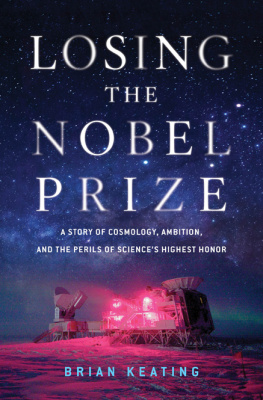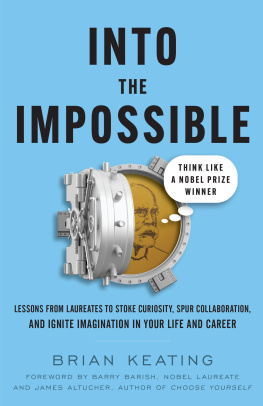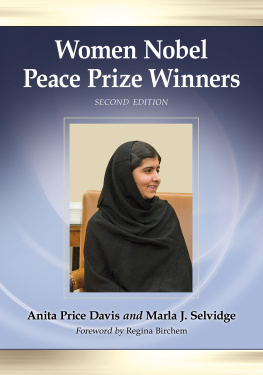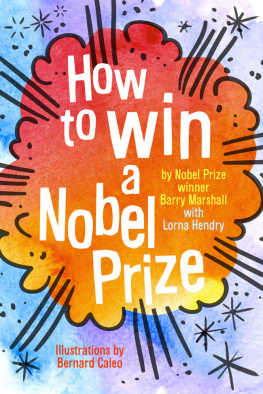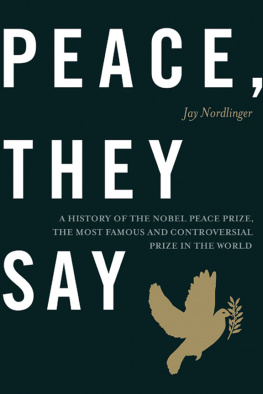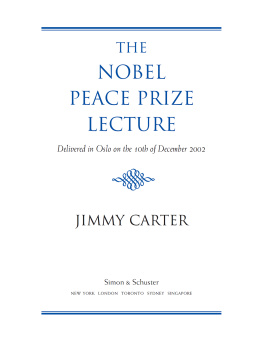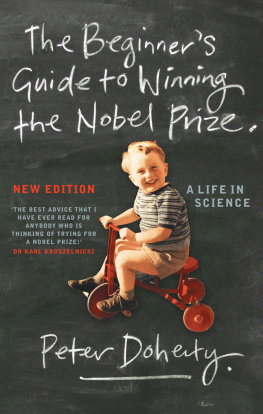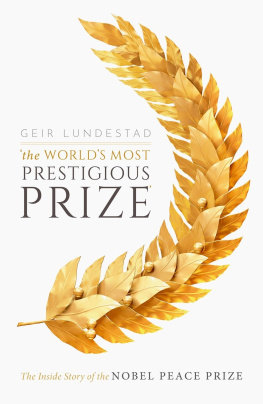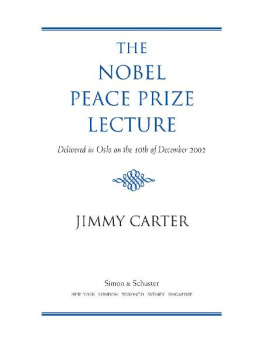
ADVANCE PRAISE FOR LOSING THE NOBEL PRIZE
Brian Keatings compulsively readable book shows us the human side of science: the passion, the competition, the jealousies, the mistakes, the triumphs, the heartbreaks. A firsthand account of how science happens at the very highest levels.
Sean Carroll, author of The Big Picture
Brian Keating is a wonderful storyteller with a very good story to tell. His tale is provocative and evocative as he takes us on a highly personal journey to the heart of the scientific exploration of the universe.
Lee Smolin, Perimeter Institute and author of Time Reborn
Our most august institutionsgovernment, billion-dollar corporations, and even staid academiaare rife with human politicking and raw ambition. In Losing the Nobel Prize, Brian Keating describes just some of that jockeying and maneuvering among the smartest people in the world, studying the most abstruse and fundamental knowledge, while chasing humanitys greatest honor. Along the way, Keating provides understandable explanations of the more mind-bending aspects of modern cosmology, and just what we know about our universe.
Antonio Garca Martnez, author of Chaos Monkeys
We all know that prizes can inspire and compel the best and brightest in society. Their motivational power is well known, but what happens when it is overshadowed by the caprice of a less-than-transparent process which has hardly changed in over a century? Lesser known is the dark side that overwhelms the otherwise noble pursuit of scientific excellence, which threatens to undermine the luster of the prize. In Losing the Nobel Prize, Brian Keating describes the thrilling highs and dramatic lows that accompany the relentless pursuit of sciences top accolade. This is a personal, cautionary tale to which we should all listen.
Peter H. Diamandis, Chairman/Founder, XPRIZE Foundation &
Singularity University and author of Abundance and BOLD
Three fascinating tales entwine between these covers; a young man growing to scientific maturity, an elusive baby picture of our universe, and the prize he hoped that picture would garner. The story, enthralling as it is, remains unfinished.
Jill Tarter, Bernard M. Oliver Chair, SETI Institute
Brian Keating shares a view from the jagged frontiers of scientific exploration, offering fresh insights into the passions, ambitions, and competition that drive many researchers today. A fascinating journey.
David Kaiser, professor of physics and the history of science, MIT, and
author of How the Hippies Save d Physics
According to Brian Keating, the Oscar and Nobel science prizes have a lot in common. In Losing the Nobel Prize, he weaves together the Nobel Prize institution, his personal life, and his own involvement in modern cosmology into a multifaceted and highly readable story. Providing a vivid picture of the adventurous and competitive world of cosmological research, he also suggests radical reforms to the venerable but perhaps outdated Stockholm institution.
Helge Kragh, emeritus professor, Aarhus University and author of
Cosmology & Controversy
Cosmologists had thought that they had glimpsed a distant image of the first moments of the universe. Instead, this image turned out to be a smudge on the window: galactic dust once again bedeviling cosmologists. Keating conveys this exciting search through a personal tale of the ups and downs of cutting edge science.
David Spergel, professor, Princeton University, and co-winner of the
2018 Breakthrough Prize in Fundamental Physics
A fascinating blend of personal history and an honest behind-the-scenes look at high-stakes science. Brian Keating was at the origin of what appeared to be one of the most exciting discoveries in modern cosmology. His vivid storytelling brings humanitys search for the origin of the Universe to life.
Jay Pasachoff, author of Peterson Field Guide to the Stars and Planets
I loved this well-told tale of science, passion, and the pursuitliterally to the ends of the earthof lifes purest questions. Brian Keating weaves together a must-read drama of big dreams, awe-inspiring technology, and a belief in the power of science to solve any puzzle. He is thoroughly modern and forward facing, questioning the veneration of the Nobel Prize, and making the case with his heartfelt story that the real prize is in the science itself.
Julian Guthrie, author of How to Make a Spaceship
LOSING THE NOBEL PRIZE
LOSING
THE
NOBEL PRIZE
A STORY OF COSMOLOGY,
AMBITION,
AND THE PERILS OF
SCIENCEs HIGHEST HONOR

BRIAN KEATING

W. W. NORTON & COMPANY
Inde pendent Publishers Since 1923
NEW YORK LONDON
Copyright 2018 by Brian Keating
All rights reserved
First Edition
For information about permission to reproduce selections from
this book, write to Permissions, W. W. Norton & Company, Inc.,
500 Fifth Avenue, New York, NY 10110
For information about special discounts for bulk purchases,
please contact W. W. Norton Special Sales at
specialsales@wwnorton.com or 800-233-4830
Book design by Lovedog Studio
Production manager: Anna Oler
JACKET DESIGN BY ERIC FUENTECILLA
JACKET PHOTOGRAPH: KEITH VANDERLINDE / NATIONAL SCIENCE FOUNDATION / REUTERS
The Library of Congress has cataloged the printed edition as follows:
Names: Keating, Brian (Brian Gregory), author.
Title: Losing the Nobel Prize : a story of cosmology, ambition, and the perils of sciences highest honor / Brian Keating.
Description: New York : W.W. Norton & Company, [2018] | Includes bibliographical references and index.
Identifiers: LCCN 2017057199 | ISBN 9781324000914 (hardcover)
Subjects: LCSH: Big bang theory. | AstronomyAwards | Cosmology. | ScienceMethodology. | Nobel Prizes.
Classification: LCC QB991.B54 K43 2018 | DDC 523.1/8079dc23
LC record available at https://lccn.loc.gov/2017057199
ISBN 978-1-324-00092-1 (e-book)
W. W. Norton & Company, Inc.
500 Fifth Avenue, New York, N.Y. 10110
www.wwnorton.com
W. W. Norton & Company Ltd.
15 Carlisle Street, London W1D 3BS
To my mother, Barbara, who gave me life,
and to Sarah, who gives me life.
A NOBLE WILL
E ACH YEAR, ON DECEMBER TENTH, THOUSANDS of worshippers convene in Scandinavia to commemorate the passing of an arms dealer known as the merchant of death. The eschatological ritual features all the rites and incantations befitting a pharaohs funeral. Haunting dirges play as the worshippers, bedecked in mandatory regalia, mourn the merchant. He is eerily present; his visage looms over the congregants as they feast on exotic game, surrounded by fresh-cut flowers imported from the merchants mausoleum. The event culminates with the presentation of gilded, graven images bearing his likeness.
This ritual is the annual Nobel Prize award ceremony, but youd be forgiven for thinking it was an occult sacrament. The focus on death might be surprising. But, in truth, the Nobel Prize was born in death. The death of Alfred, inventor of dynamite, birthed the prize that redeemed the Nobel name, achieving the ultimate in posthumous public relations.
The Nobel Prize is not merely sciences most esteemed accolade, but the worlds most prestigious award. Its goal: to recognize humanitys crowning achievements in the sciences, free from ideological agendas or fashion, as well as to reward poets and peacemakers who enrich mankind. When its done right, it is a truly lustrous meritocratic reward system. Yet, in this book, I explore the case
Next page
